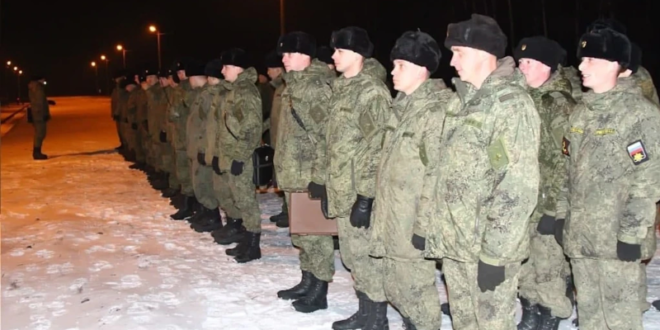NATO allies have put their forces on standby and are bolstering their presence in Eastern Europe amid concerns over a Russian military buildup near Ukraine, in what Moscow called a provocation.
Outlining a series of recent announcements by individual members of current or upcoming deployments, NATO said on January 24 that Denmark, Spain, France, and the Netherlands were all planning or considering sending troops, planes, or ships to Eastern Europe.
The United States said it was placing 8,500 troops on “heightened alert” to be ready to deploy to Europe, potentially at short notice, if needed to reassure NATO allies.
The announcements come amid intelligence reports that Russia has placed more than 125,000 troops near the border of Ukraine, spawning mounting concern over an imminent incursion.
“NATO will continue to take all necessary measures to protect and defend all allies, including by reinforcing the eastern part of the alliance,” NATO chief Jens Stoltenberg said in a statement.
U.S. President Joe Biden has begun considering options to boost U.S. military assets in the Baltics and Eastern Europe, administration officials said, after he met with top national-security officials over the weekend.
The New York Times first reported the options presented to the president, who is expected to make a decision this week. One option under consideration is transferring 1,000 to 5,000 troops to Eastern European countries, with the possibility of sending more should tensions flare further.
“The United States has also made clear that it is considering increasing its military presence in the eastern part of the alliance,” the NATO statement said.
The Pentagon later said it was placing 8,500 troops on high alert but that no final decisions have been made on deployments.
“It’s very clear that the Russians have no intention right now of de-escalating,” press secretary John Kirby told reporters.
Biden is set to hold a video call with European leaders later on January 24, including Stoltenberg, European Commission President Ursula von der Leyen, European Council President Charles Michel, French President Emmanuel Macron, German Chancellor Olaf Scholz, Italian Prime Minister Mario Draghi, Polish President Andrzej Duda, and British Prime Minister Boris Johnson.
Russia denies any intention of invading and accuses the United States and its allies of provoking the situation.
In reaction, Kremlin spokesman Dmitry Peskov said on January 24 that the United States and NATO were escalating tensions through “information hysteria” and “concrete actions,” adding that the risk of an offensive by Ukrainian troops against pro-Russia separatists was “very high.”
“This is not happening because of what we, Russia, are doing. This is all happening because of what NATO and the U.S. are doing and due to the information they are spreading,” Peskov said.
Russia has used its menacing troop buildup to issue a list of demands to redraw the security architecture in Europe. Moscow wants NATO to abandon any prospect of Ukraine one day joining the alliance and seeks a major pullback of the alliance’s forces from Eastern Europe. Alliance members Slovakia, Romania, Poland, and Hungary all border Ukraine.
Washington and its allies say many Russian demands are nonstarters, but they have shown a willingness to discuss arms control, missile deployments, and confidence-building measures. Four rounds of high-level diplomacy this month between Russia and the West failed to reach a breakthrough.
In a sign of the growing fears of a possible imminent Russian invasion, Britain and the United States announced the departure of some embassy staff and dependents from Ukraine.
The orders were issued “due to the continued threat of Russian military action,” the State Department said in a statement.
Asked whether he thought an invasion was imminent, Johnson said intelligence was “pretty gloomy on this point.”
“I don’t think it’s by any means inevitable now. I think that sense can still prevail,” he said, repeating Western warnings that invading Ukraine would be “a painful, violent, and bloody business” for Russia.
Ukraine characterized the U.S. move as “premature,” with Foreign Ministry spokesman Oleh Nikolenko saying in a statement that it was important to “remain calm.”
“We consider such a step by the American side premature and a display of excessive caution,” Nikolenko said.
“The Russian Federation is currently making active efforts to destabilize the domestic situation in Ukraine,” he said, adding that “disinformation, manipulation” was being spread by the media to “sow panic among Ukrainians and foreigners.”
Borrell said on January 24 that the bloc did not have any immediate plans to order its staff out of Ukraine.
“We are not going to do the same thing because we don’t know any specific reasons,” Borrell said as he arrived for a meeting of EU foreign ministers in Brussels. “I don’t think we had to dramatize as far as the negotiations are going on — and they are going on.”
After the meeting, EU foreign ministers warned Russia it would face “massive” consequences, echoing repeated comments from the United States of tough sanctions should Russia attack Ukraine.
But with the 27-member bloc divided on what the exact consequences would be, Ukrainian President Volodymyr Zelenskiy told EU President Michel by phone that it was important for Kyiv that the EU showed unity.
“Ukraine will not fall for provocations, and together with its partners, will remain calm and restrained,” his office said.
Separately, the bloc announced a 1.2 billion euro ($1.36 billion) financial aid package for Ukraine to mitigate the financial fallout of the tensions, which have hit Ukrainian government yields.
Meanwhile, Irish Foreign Minister Simon Coveney said on January 24 that Russia has notified Dublin of Russian naval exercises in international waters in the Irish Sea, adding that they were unwelcome.
“We don’t have a power to prevent this happening, but certainly I have made it clear to the Russian ambassador in Ireland that this is not welcome. This isn’t a time to increase military activity and tension,” Coveney said.
 Eurasia Press & News
Eurasia Press & News


